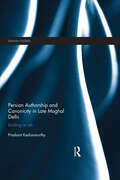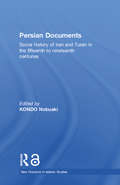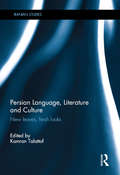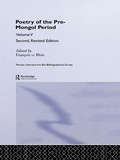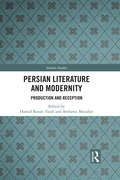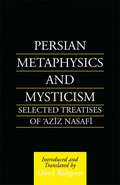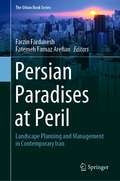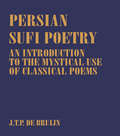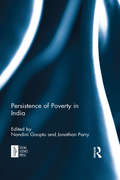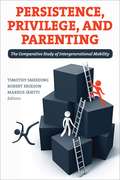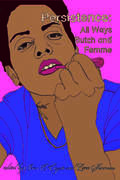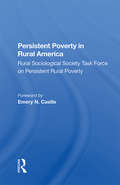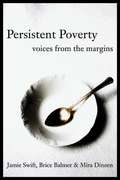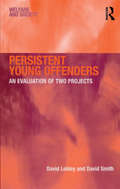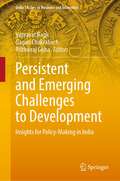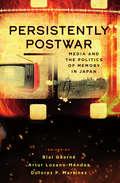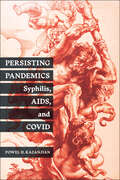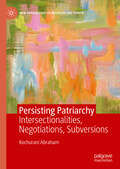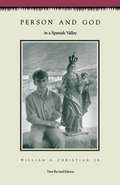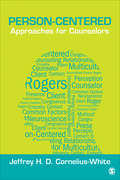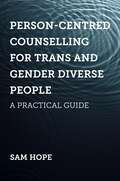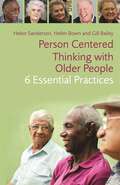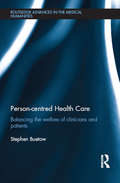- Table View
- List View
Persian Authorship and Canonicity in Late Mughal Delhi: Building an Ark (Iranian Studies)
by Prashant KeshavmurthyWriting in the eighteenth century, the Persian-language litterateurs of late Mughal Delhi were aware that they could no longer take for granted the relations of Persian with Islamic imperial power, relations that had enabled Persian literary life to flourish in India since the tenth century C.E. Persian Authorship and Canonicity in Late Mughal Delhi situates the diverse textual projects of ‘Abd al-Qādir “Bīdil” and his students within the context of politically threatened but poetically prestigious Delhi, exploring the writers’ use of the Perso-Arabic and Hindavi literary canons to fashion their authorship. Breaking with the tendency to categorize and characterize Persian literature according to the dynasty in power, this book argues for the indirectness and complexity of the relations between poetics and politics. Among its original contributions is an interpretation of Bīdil’s Sufi adaptation of a Braj-Avadhi tale of utopian Hindu kingship, a novel hypothesis on the historicism of Sirāj al-Din ‘Alī Khān “Ārzū”s oeuvre and a study of how Bindrāban Dās “Khvushgū" entwined the contrasting models of authorship in Bīdil and Ārzū to formulate his voice as a Sufi historian of the Persian poetic tradition. The first book-length work in English on ‘Abd al-Qādir “Bīdil” and his circle of Persian literati, this is a valuable resource for students and scholars of both South Asian and Iranian studies, as well as Persian literature and Sufism.
Persian Documents: Social History of Iran and Turan in the 15th-19th Centuries (New Horizons in Islamic Studies)
by Kondo NobuakiAfter the Mongol period, Persian was the official written language in Iran, Central Asia and India. A vast amount of documents relating to administration and social life were produced and yet, unlike Ottoman and Arabic documents, Persian historical resources have received very little critical attention. This book is the first to use Persian Documents as the sources of social history in Early Modern Iran and Central Asia. The contributors examine four distinct elements of the documents:* the formal aspects of the sources are initially inspected* the second part focuses on newly discovered sources* the most abundant documents of the period - waqf deeds - are individually studiedIn this way the reader is led to realize the importance of Persian documents in gaining an understanding of past urban and rural societies in the Middle East.
Persian Language, Literature and Culture: New Leaves, Fresh Looks (Iranian Studies)
by Kamran TalattofCritical approaches to the study of topics related to Persian literature and Iranian culture have evolved in recent decades. The essays included in this volume collectively demonstrate the most recent creative approaches to the study of the Persian language, literature, and culture, and the way these methodologies have progressed academic debate. Topics covered include; culture, cognition, history, the social context of literary criticism, the problematics of literary modernity, and the issues of writing literary history. More specifically, authors explore the nuances of these topics; literature and life, poetry and nature, culture and literature, women and literature, freedom of literature, Persian language, power, and censorship, and issues related to translation and translating Persian literature in particular. In dealing with these seminal subjects, contributors acknowledge and contemplate the works of Ahmad Karimi Hakkak and other pioneering critics, analysing how these works have influenced the field of literary and cultural studies. Contributing a variety of theoretical and inter-disciplinary approaches to this field of study, this book is a valuable addition to the study of Persian poetry and prose, and to literary criticism more broadly.
Persian Literature - A Bio-Bibliographical Survey: Poetry of the Pre-Mongol Period (Volume V) (Royal Asiatic Society Books #149.5)
by Francois De BloisThis famous work from the Royal Asiatic Society is an indispensable tool for all serious students of Persian literature, history and culture, and a welcome companion to Persian literature in its most glorious period. This volume is the second, revised edition of three parts published in 1992 and 1994.
Persian Literature and Modernity: Production and Reception (Iranian Studies)
by Hamid Rezaei Yazdi Arshavez MozafariPersian Literature and Modernity recasts the history of modern literature in Iran by elucidating the bonds between the classical tradition and modernity and exploring textual, generic and discursive formations through heterodoxical investigations. This is first done through the rehabilitation of concepts embedded in tradition, including the munāzirah (debate), Ahrīman (the demonic), tajarrud (radical aloneness) and nāriz̤āyatī (discontent). Following this are broader structural and processual treatments, including the emergence of the genre of the social novel, the international dimension of Persian and Persianate canon formation, and the development of salvage ethnography and anthropological discourse in Iran. Covering literary experiments from the twelfth to the twentieth centuries, the chapters in this volume make a case for stepping outside the bounds of orthodox literary scholarship in Iranian studies with its associated political and orientalist determinants in order to provide a more nuanced conception of literary modernity in Iran. Offering an alternative reading of modernity in Persian literature, this book is an invaluable resource for scholars and students interested in the history of modern Iran and Persian Literature.
Persian Metaphysics and Mysticism: Selected Works of 'Aziz Nasaffi (Curzon Persian Art And Culture Ser.)
by Lloyd RidgeonOne of the foremost 13th-century Persian mystics, 'Aziz Nasaffi with his simple manner of explaining God, His Essence, Attributes and Acts provides the western reader with an overview of all the major interpretations of medieval Islamic thought. Providing the first comprehensive selection in English of Nasaffi's treatises, Dr Ridgeon's work offers the western student of Islam a much-needed guide to the speculative and practical dimensions of Sufism.
Persian Paradises at Peril: Landscape Planning and Management in Contemporary Iran (The Urban Book Series)
by Fatemeh Farnaz Arefian Farzin FardaneshThis book offers a resourceful collection of essays examining recent efforts to respond to the challenges of planning, management and conserving landscapes in contemporary Iran, the home of Persian gardens. Drawing on selected recent studies, the chapters discuss the following topics: The sphere of knowledge and theoretical bases, including a survey of recent and ongoing research;Persian gardens remaining from the 6th century BC to the 19th century AD, which have influenced garden design in a vast geographic domain extending from India to Spain;Management and conservation of cultural landscapes, historic urban landscapes (HUL), road landscapes, and natural landscapes in the face of changes in climatic conditions and livelihood practices affecting their delicate dynamic balance and functions essential to their distinctive character; and Historic Territorial Landscapes (HTL) formed and evolved along the Silk and Spice Roads as compositions of tangible and intangible elements resulting from movement, exchanges and dialogue in space and over time.The book is a useful resource for a range of academics and professionals, such as landscape architects and managers, landscape historians and conservationists, and urban planners and managers.
Persian Sufi Poetry: An Introduction to the Mystical Use of Classical Persian Poems (Routledge Sufi Series #No.3)
by J. T. BruijnFocuses on the poems rather than on their authors. Surveys the development of Persian mystical poetry, dealing first with the relation between Sufism and literature and then with the four main genres of the tradition: the epigram, the homiletic poem, love poetry and symbolic narrative.
Persistence of Poverty in India
by Nandini Gooptu and Jonathan ParryWhat distinguishes Persistence of Poverty from most other poverty studies is the way in which it conceptualises the problem. This volume offers a variety of alternative analytical perspectives and fresh insights into poverty that are key to addressing the problem. In looking at the day to day lived realities of the poor the volume points out that in order to understand poverty one must take into account the wider system of class and power relations in which it is rooted. This volume suggests that ‘democracy in India may be as big a part of the problem as it is of the solution.’
Persistence, Privilege, and Parenting: The Comparative Study of Intergenerational Mobility
by Markus Jäntti Timothy Smeeding Robert EriksonAmericans like to believe that theirs is the land of opportunity, but the hard facts are that children born into poor families in the United States tend to stay poor and children born into wealthy families generally stay rich. Other countries have shown more success at lessening the effects of inequality on mobility—possibly by making public investments in education, health, and family well-being that offset the private advantages of the wealthy. What can the United States learn from these other countries about how to provide children from disadvantaged backgrounds an equal chance in life? Making comparisons across ten countries, Persistence, Privilege, and Parenting brings together a team of eminent international scholars to examine why advantage and disadvantage persist across generations. The book sheds light on how the social and economic mobility of children differs within and across countries and the impact private family resources, public policies, and social institutions may have on mobility. In what ways do parents pass advantage or disadvantage on to their children? Persistence, Privilege, and Parenting is an expansive exploration of the relationship between parental socioeconomic status and background and the outcomes of their grown children. The authors also address the impact of education and parental financial assistance on mobility. Contributors Miles Corak, Lori Curtis, and Shelley Phipps look at how family economic background influences the outcomes of adult children in the United States and Canada. They find that, despite many cultural similarities between the two countries, Canada has three times the rate of intergenerational mobility as the United States—possibly because Canada makes more public investments in its labor market, health care, and family programs. Jo Blanden and her colleagues explore a number of factors affecting how advantage is transmitted between parents and children in the United States and the United Kingdom, including education, occupation, marriage, and health. They find that despite the two nations having similar rates of intergenerational mobility and social inequality, lack of educational opportunity plays a greater role in limiting U.S. mobility, while the United Kingdom’s deeply rooted social class structure makes it difficult for the disadvantaged to transcend their circumstances. Jane Waldfogel and Elizabeth Washbrook examine cognitive and behavioral school readiness across income groups and find that pre-school age children in both the United States and Britain show substantial income-related gaps in school readiness—driven in part by poorly developed parenting skills among overburdened, low-income families. The authors suggest that the most encouraging policies focus on both school and home interventions, including such measures as increases in federal funding for Head Start programs in the United States, raising pre-school staff qualifications in Britain, and parenting programs in both countries. A significant step forward in the study of intergenerational mobility, Persistence, Privilege, and Parenting demonstrates that the transmission of advantage or disadvantage from one generation to the next varies widely from country to country. This striking finding is a particular cause for concern in the United States, where the persistence of disadvantage remains stubbornly high. But, it provides a reason to hope that by better understanding mobility across the generations abroad, we can find ways to do better at home.
Persistence: All Ways Butch and Femme
by Ivan E. Coyote Zena SharmanLambda Literary Award finalistAmerican Library Association Stonewall Honor BookIn the summer of 2009, butch writer and storyteller Ivan Coyote and gender researcher and femme dynamo Zena Sharman wrote down a wish-list of their favourite queer authors; they wanted to continue and expand the butch-femme conversation. The result is Persistence: All Ways Butch and Femme. The stories in these pages resist simple definitions. The people in these stories defy reductive stereotypes and inflexible categories. The pages in this book describe the lives of an incredible diversity of people whose hearts also pounded for some reason the first time they read or heard the words "butch" or "femme."Contributors such as Jewelle Gomez (The Gilda Stories), Thea Hillman (Intersex), S. Bear Bergman (Butch is a Noun), Chandra Mayor (All the Pretty Girls), Amber Dawn (Sub Rosa), Anna Camilleri (Brazen Femme), Debra Anderson (Code White), Anne Fleming (Anomaly), Michael V. Smith (Cumberland), and Zoe Whittall (Bottle Rocket Hearts) explore the parameters, history, and power of a multitude of butch and femme realities. It's a raucous, insightful, sexy, and sometimes dangerous look at what the words butch and femme can mean in today's ever-shifting gender landscape, with one eye on the past and the other on what is to come.Includes a foreword by Joan Nestle, renowned femme author and editor of The Persistent Desire: A Femme-Butch Reader, a landmark anthology originally published in 1992.Ivan E. Coyote is the author of seven books (including the novel Bow Grip, an American Library Association Stonewall Honor Book) and a long-time muser on the trappings of the two-party gender system.Zena Sharman is the assistant director of Canada's national Institute of Gender and Health.
Persistent Poverty In Rural America
by Rural Sociological SocietyA team of anthropologists, economists, geographers, political scientists, social workers, and sociologists examine the leading explanations for why poverty persists in rural America. Their findings discredit established theories such as the culture of poverty and suggest new explanations for rural poverty and new directions for antipoverty programs
Persistent Poverty: Voices From the Margins
by Jamie Swift Brice Balmer Mira DineenIt’s a very short trip from the limousine seat to the curb. Jim Mann never missed a payroll for the dozen men who worked for his flourishing landscaping business he built from the ground up. Now he lives hand-to-mouth. His pockets are empty long before his next social assistance cheque arrives. In early 2010 over two hundred civic and faith leaders fanned out into thirty Ontario communities. Their goal? To explore how the least fortunate people in one of the world’s richest places are faring. The Interfaith Social Assistance Reform Coalition’s latest social audit exposed a tattered social assistance system run by volunteers desperately struggling to fill the gaps. There can be no papering over the savage inequalities and suffering exposed in this compelling look at life from the margins.
Persistent Young Offenders: An Evaluation of Two Projects
by David Smith David LobleyBased on some of the most interesting research of the last ten years, this book discusses effective practice in work with persistent young offenders. It contrasts two major evaluations of projects for juvenile offenders, one of which was successful and the other less so. The projects, Freagarrach and CueTen, were funded by The Scottish Office and the Scottish Executive. Freagarrach was evaluated over five years from 1995 and CueTen over three years (its entire lifespan) from 1996. This book makes the findings of these projects available to a wider readership, setting them in a wider discursive framework than is appropriate in a government report. The authors identify the factors that made Freagarrach a more successful project than CueTen, arguing that an understanding of these factors is important in drawing general conclusions from the experience of the two projects, and that this is particularly the case because some of these factors have received little attention in recent discussions of 'what works' in community-based programmes for offenders. This is a detailed and thorough study of work with juvenile offenders, which will be of particular value to those interested in less punitive approaches. It will be of interest both to practitioners and to academics in criminology, social policy and social work.
Persistent and Emerging Challenges to Development: Insights for Policy-Making in India (India Studies in Business and Economics)
by Gagari Chakrabarti Supravat Bagli Prithviraj GuhaThis book covers a wide range of the issues in development studies. Recognizing the existence of manifold challenges in achieving and sustaining economic development, it is divided into four sections—(i) The Macroeconomy: Foreign Trade, Structural Transition and the Environment, (ii) Health and Standard of Living, (iii) Education, Human Capital and Evolution of the Employment Quality in India, and (iv) Banking and Credit: Access, Efficiency and Stability. The book brings together a right mix of senior and young economists who use cutting edge econometric techniques and/ or revisit a perennial question with much sharper focus and tools to unravel insights that are important and will inform tomorrow’s theorisation and policy making. The volume looks at important questions like spatial concentration of low infant and child health outcomes, trade liberalisation and export quality, intergenerational occupational mobility, multidimensional poverty incidence in rural India, robustness of the banking sector, to name a few. To do so, the contributions use novel and esoteric methods like machine learning, spatial econometrics, system GMM, quintile regression and counterfactual decomposition (QRCD), and so on. The rich collection holds importance for researchers and policy makers alike, and also for practitioners working in different developmental sectors..
Persistently Postwar: Media and the Politics of Memory in Japan
by Blai Guarné Artur Lozano-Méndez Dolores P. MartinezFrom melodramas to experimental documentaries to anime, mass media in Japan constitute a key site in which the nation’s social memory is articulated, disseminated, and contested. Through a series of stimulating case studies, this volume examines the political and cultural representations of Japan’s past, showing how they have reinforced personal and collective narratives while also formulating new cultural meanings, both on a local scale and in the context of transnational media production and consumption. Drawing upon diverse disciplinary insights and methodologies, these studies collectively offer a nuanced account in which mass media functions as much more than a simple ideological tool.
Persisting Pandemics: Syphilis, AIDS, and COVID (Critical Issues in Health and Medicine)
by Powel H. KazanjianPersisting Pandemics explores the history of syphilis and AIDS to provide insights into the limits of biomedicine and our experience with epidemics today. Novel therapies developed for syphilis and AIDS became renowned in the medical field and the broader public sphere as exemplars of biomedical innovations. Public health campaigns based on these spectacular biomedical advances, however, have repeatedly fallen short of their goals to eliminate syphilis and AIDS in the population. The diseases epitomize the power of innovative biomedical therapies for the individual while unveiling limitations of scientific medicine in the domain of public health. The need for a public health approach to address mistrust in science, government indifference, and racial inequalities is relevant for strategies to eliminate COVID-19 today. Persisting Pandemics argues that campaigns to eliminate these diseases have not succeeded because they have not adequately addressed how diseases like AIDS, syphilis, and COVID spread unevenly in populations according to race, ethnicity, and geographic location. Despite the expectation of public health officials that medical advances would render epidemics obsolete, new diseases continue to emerge and spread regardless of efforts to eliminate them. Medical doctor and historian Powel H. Kazanjian concludes that narratives of syphilis, AIDS and COVID, unlike smallpox, do not contain a discrete ending—at least not within the timelines specified by their elimination campaigns. Instead they will be a continued part of our existence.
Persisting Patriarchy: Intersectionalities, Negotiations, Subversions (New Approaches to Religion and Power)
by Kochurani AbrahamThis book examines the operational dynamics of patriarchy that is deeply woven into the Indian cultural fabric and its persistence in spite of women advancing in Human Development Indices. In studying the situation of women of the Catholic Syrian Christian community of Kerala, South India, as a case of analysis, Kochurani Abraham identifies caste consciousness and religious prescriptions of this community as the main factors that intersect with gendered identity construction and succeed in keeping women within its patriarchal confines. While women do engage in negotiating patriarchy through what can be termed simulative, tactical, and ‘agensic’ bargains, this remains a ‘politics of survival’ as it does not challenge the established gender order. In this context, making a shift from ‘politics of survival’ to a ‘politics of subversion’ is imperative for challenging persisting patriarchies.
Person Centred Approaches When Supporting People with a Learning Disability
by Liz TillyThis book will support your learning about person centred approaches for the Common Induction Standards and the diploma units:
Person and God in a Spanish Valley: Revised Edition
by William A. ChristianThe description for this book, Person and God in a Spanish Valley, will be forthcoming.
Person-Centered Approaches for Counselors (Theories for Counselors)
by Jeffrey H. Cornelius-WhiteIntegrating common factors research and practice, Person-Centered Approaches for Counselors by H. D. Cornelius-White highlights the deep social justice roots of the approaches and shows counselors in training and experienced therapists how to integrate person-centered process and outcome measures to improve therapy outcomes. For each of the person-centered approaches covered (including classical, focusing, emotion-focused, intersubjective, and interdisciplinary orientations) this accessible book covers historical development, theory, process, evaluation, and application. Person-Centered Approaches for Counselors is part of the SAGE Theories for Counselors Series that includes Psychoanalytic Approaches for Counselors by Frederick Redekop and Cognitive Behavioral Approaches for Counselors by Diane Shea.
Person-Centered Approaches for Counselors (Theories for Counselors)
by Jeffrey H. Cornelius-WhiteIntegrating common factors research and practice, Person-Centered Approaches for Counselors by H. D. Cornelius-White highlights the deep social justice roots of the approaches and shows counselors in training and experienced therapists how to integrate person-centered process and outcome measures to improve therapy outcomes. For each of the person-centered approaches covered (including classical, focusing, emotion-focused, intersubjective, and interdisciplinary orientations) this accessible book covers historical development, theory, process, evaluation, and application. Person-Centered Approaches for Counselors is part of the SAGE Theories for Counselors Series that includes Psychoanalytic Approaches for Counselors by Frederick Redekop and Cognitive Behavioral Approaches for Counselors by Diane Shea.
Person-Centred Counselling for Trans and Gender Diverse People: A Practical Guide
by Sam HopeTrans clients are frequently doubted, misunderstood, infantilised and judged by professionals, and this book presents an approach that ensures psychological wellbeing and trust is built between counsellor and client. This person-centred, affirmative approach is based around unlearning assumptions about gender and destabilising professionals' ideas of 'knowing better' than, and judging the client, so that they can forge a relationship and connection that is on an equal footing. The book explores a range of topics such as the overlap of gender diversity and autism, sex and sexuality, intersectionality, unconscious bias and reflective practice. Essential reading for professionals that want to support trans people's mental health and social wellbeing.
Person-Centred Thinking with Older People: 6 Essential Practices
by Helen Sanderson Gill Bailey Dorothy Runnicles David Brindle Helen BownPerson-centred practices are a key way to provide the best possible care and support for older people and help them to be active and valued members of the community. Drawing on a wealth of experience of working with older people, the authors present the 6 essential person-centred practices. Each of the practices is designed to support the individual and put what is important to and for the person at the forefront of their care. Each practice has been tailored so that older people can express more easily what does and does not work for them. By actively listening and making each person feel appreciated, the practices represent practical tools for frontline practitioners to form good relationships with people in their care. With supporting stories and full colour photographs to illustrate how person-centred thinking and practice is used in real-life settings, there are many examples to help practitioners to overcome challenges and to really implement positive, effective changes to care. This practical book will be a valuable resource for care staff, social workers and healthcare workers who want to learn about person-centred practices to deliver best practice care and support.
Person-centred Health Care: Balancing the Welfare of Clinicians and Patients (Routledge Advances in the Medical Humanities)
by Stephen BuetowPerson-centred health care is increasingly endorsed as a key element of high-quality care, yet, in practice, it often means patient-centred health care. This book scrutinizes the principle of primacy of patient welfare, which, although deeply embedded in health professionalism, is long overdue for critical analysis and debate. It appears incontestable because patients have greater immediate health needs than clinicians and the patient-clinician encounter is often recognized as a moral enterprise as well as a service contract. However, Buetow argues that the implication that clinician welfare is secondary can harm clinicians, patients and health system performance. Revaluing participants in health care as moral equals, this book advocates an ethic of virtue to respect the clinician as a whole person whose self-care and care from patients can benefit both parties, because their moral interests intertwine and warrant equal consideration. It then considers how to move from values including moral equality in health care to practice for people in their particular situations. Developing a genuinely inclusive concept of person-centred care – accepting clinicians as moral equals – it also facilitates the coalescence of patient-centred care and evidence-based health care. This reflective and provocative work develops a constructive alternative to the taken-for-granted principle of primacy of patient welfare. It is of interest to students and academics in the health and caring sciences, philosophy, ethics, medical humanities and health management.
